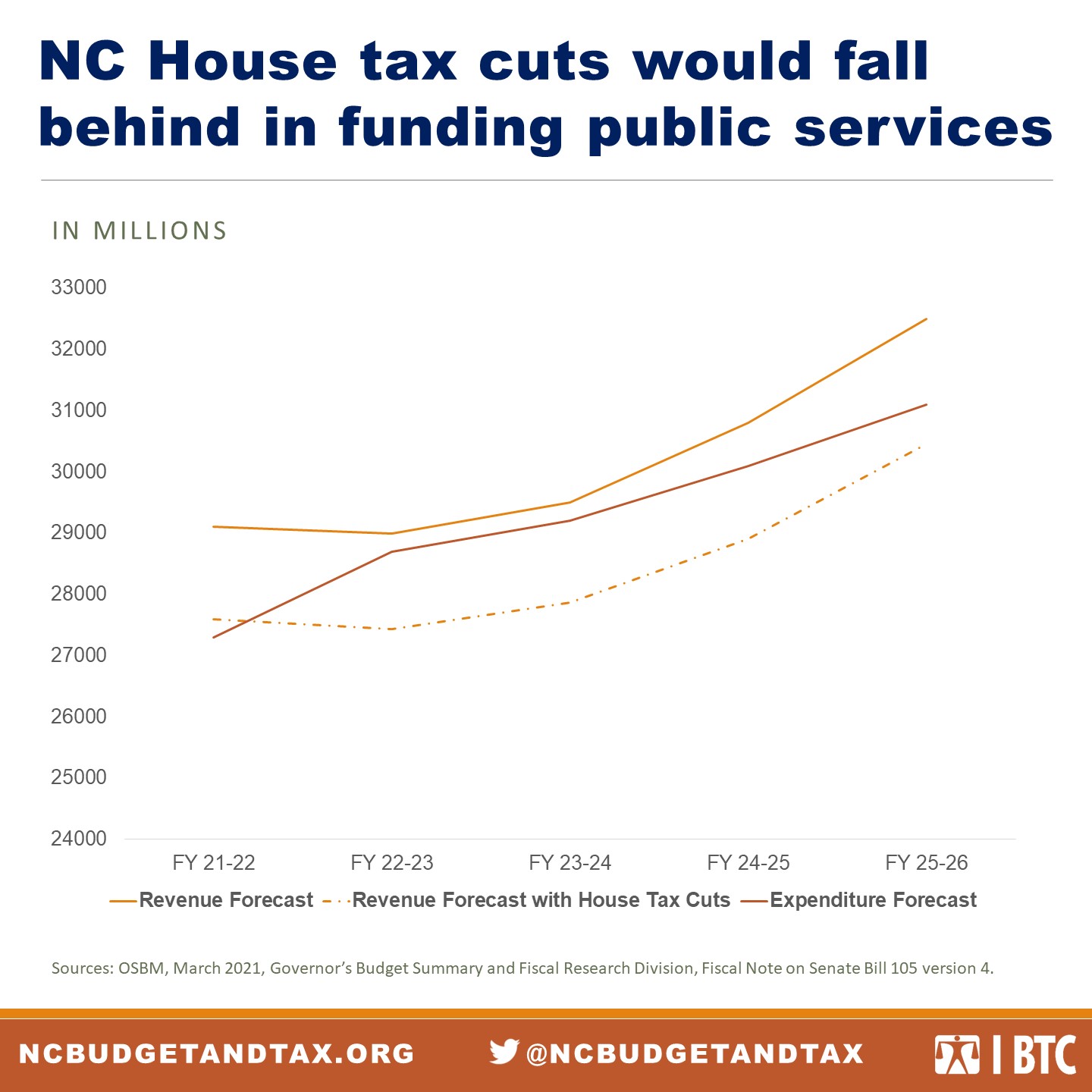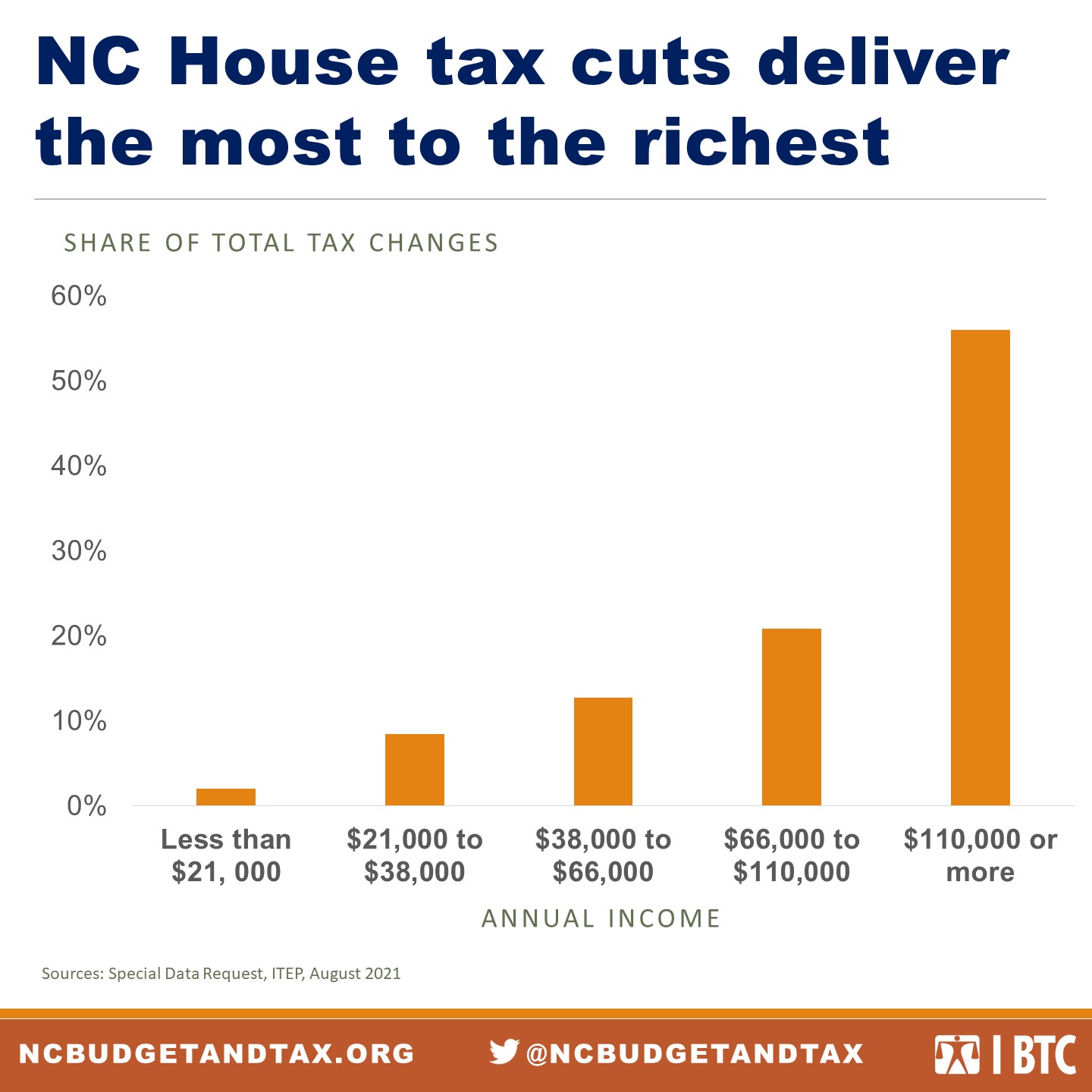The N.C. House tax plan would continue to reduce income tax rates even as economic hardship persists and real, sustained investments will be required to ensure that the state and every community can thrive.
The plan reviewed in the House Finance committee Monday afternoon would reduce the state’s flat income tax rate to 4.99 percent after Jan. 1, 2022, and phase-down the corporate income tax rate from 2.5 percent to 2.25 percent in tax year 2024 and to 1.99 percent beginning in tax year 2025.
These rate cuts aren’t nearly as bad as the Senate’s proposal, but make no mistake — they aren’t good either. (And Speaker Moore’s statements in a press event yesterday, suggest that the House leadership shares the Senate’s goal of getting to zero income taxes.)
The full impact of the changes by 2025 would be a reduction of $2 billion in annual revenue that otherwise could have funded priorities for the well-being of the state and the people. By just the second year of the biennial budget, the state’s revenue with these tax cuts would fall below the required funding level needed to keep up with enrollment growth in K-12 and post-secondary schools, as well as the costs of delivering health care services.

Falling behind current service levels would be even more damaging to people’s everyday lives since the public funding levels currently are so far below a basic commitment to people’s well-being and the functioning of a strong economy. The pandemic and downturn should have taught us that a collective commitment to each other is the foundation for health, well-being, and financial security we all can enjoy.
So let’s consider what would happen if the House budget were to move forward with the income tax rate cuts just in the area of education. As North Carolina parents and children know well, the constitutional obligation that the state has to ensure a sound, basic education is not being met by the state. In the Leandro case, the courts have pointed to the persistent violation of that right over decades — an incalculable cost to the state’s educational attainment and the well-being of North Carolinians — and have established a set of funding benchmarks to demonstrate the fulfillment of the commitment. Assessing that required funding alongside the tax cuts finds that North Carolina would have $4 billion less by 2026 than what is needed to sustain the commitment to a sound, basic education by the time the tax cuts are fully in effect.
So why are tax cuts still on the table?
The House agreed with the Senate early in this process on an arbitrary spending limit that reflects an imaginary estimate of what the state should be spending — based more on what is necessary to keep our funding levels on a downward slope rather than on consideration of the needs and priorities.
The House leadership is also buying in, once again, to the flawed idea that reducing income tax rates is going to keep taxes low. Time and again, researchers have shown that states with lower or no income taxes are often higher tax states for those with middle and low incomes. The continued pursuit of rate cuts rather than careful consideration of ways to address the higher tax load carried by middle- and low-income taxpayers is primarily helping the richest and is part of a long march that legislative leaders have pressed forward since 2013. It is also not helping our economy or ensuring that our communities have what is needed to increase economic mobility.
Instead, the House tax plan would deliver the greatest share of the net tax cut to the richest North Carolinians. Fifty-six percent of the net tax cut would go to the richest 20 percent in North Carolina. During the House Finance debate, proponents of the tax plan suggested that North Carolinians with poverty-level incomes would see a more than $200 income tax cut, but a more complete analysis of the total state and local taxes tells a different story. Just a quarter of those North Carolinians with the lowest income in the state would receive an income tax cut, and the poorest 20 percent of the income distribution would receive just 2 percent of the total tax cuts in the package.

The House leadership can’t help North Carolina’s economy with tax cuts — it didn’t work to boost the economy when things were going well nationally and it won’t work now. Indeed, North Carolina continued to follow unexceptional growth without improving employment levels or driving down hardship faster than other states after the Great Recession.
The House tax plan isn’t targeted toward the people carrying the heaviest tax loads as a share of their income, and it wouldn’t expand opportunity in the state. It would only consolidate opportunity in the hands of the few. This isn’t the tax plan that we need in a pandemic and a downturn. This isn’t a tax plan that could get us to resiliency in the future.
Alexandra Forter Sirota is the Director of the Budget & Tax Center, a project of the NC Justice Center.
 Justice Circle
Justice Circle